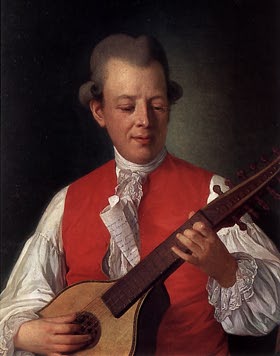Carl Michael Bellman (Carl Michael Bellman)

Carl Michael Bellman; 4 February 1740 – 11 February 1795) was a Swedish poet, songwriter, composer and performer. Bellman is a central figure in the Swedish song tradition and remains a powerful influence in Swedish music, as well as in Scandinavian literature, to this day. Bellman is best known for two collections of poems set to music, Fredman’s songs (Fredmans sånger) and Fredman’s epistles (Fredmans epistlar). Each consists of about 70 songs. The general theme is drinking, but the songs “most ingeniously” combine words and music to express feelings and moods ranging from humorous to elegiac, romantic to satirical. Carl Michael Bellman’s patrons included the King, Gustav III of Sweden, who called him the master improviser. Bellman has been compared to Shakespeare, Beethoven, Mozart, and Hogarth, but his gift, using elegantly rococo classical references in comic contrast to sordid drinking and prostitution, which are at once regretted and celebrated in song, is unique. Bellman’s songs continue to be performed and recorded by musicians from Scandinavia and in other languages including English, French, German, Italian and Russian. Several of his songs including Gubben Noak and Fjäriln vingad are known by heart by many Swedes.
After the assassination of the King at the Stockholm opera in 1792, support for the liberal arts was withdrawn. Bellman, already in poor health from alcoholism, went into decline, drinking increasingly heavily. His drinking very likely contributed to his gout, which troubled him badly in 1790. He also caught tuberculosis: the disease had already killed his mother, and by the winter of 1792, he was seriously ill. The threat of ruin and imprisonment all his life—”for a wretched[ly small] debt of 150 Rdr”. The rumour was that a former Customs colleague, E. G. Nobelius, had had his advances to Louise Bellman rejected, and in revenge had sued Bellman for the debt, knowing he was penniless: he owed a total of almost 4,000 Riksdaler.[24] On 11 February 1795, he died in his sleep in his house in Gamla Kungsholmsbrogatan. He was buried in Klara churchyard with no gravestone, its location now unknown. The Swedish Academy belatedly placed a memorial in the churchyard in 1851, complete with a bronze medallion by Johan Tobias Sergel.
Born
- February, 04, 1740
- Stockholm, Sweden
Died
- February, 02, 1795
- Stockholm, Sweden
Cemetery
- Klara Kyrkogård
- Stockholm, Sweden



